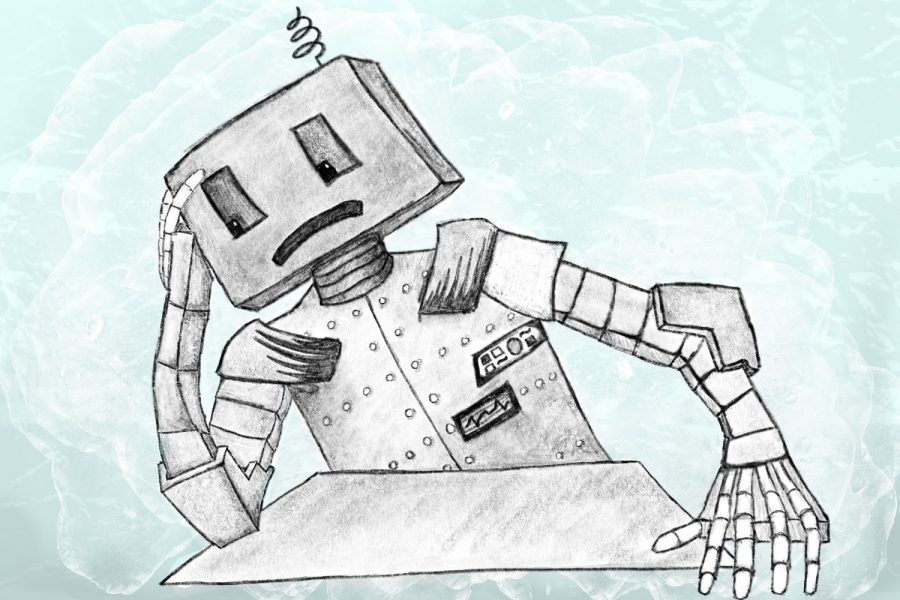AI essay writing reveals problems with universities, not students
February 9, 2023
Disclaimer: Not written with AI
Students using AI to write essays is troublesome in and of itself, but it’s also indicative of other problems with higher education.
Academic dishonesty is universal and prevalent across generations. With the release of OpenAI’s ChatGPT program, academic integrity has been propelled into public discussion once again. Not without reason, as one million users had signed up within a week of release, according to a Dec. 5, 2022 Tweet by OpenAI President Greg Brockman.
To understand the frenzy surrounding ChatGPT, it’s important to understand its capabilities and limitations.
Ethan Mollick, a professor of entrepreneurship and innovation at the Wharton School at the University of Pennsylvania, describes ChatGPT as an “omniscient, eager-to-please intern who sometimes lies to you,” according to a Dec 19, 2022 article from NPR.
In fact, Mollick permits the use of ChatGPT in his class, due to the fact that he believes academic dishonesty is widespread. Mollick took the radical approach of trying to regulate ChatGPT as opposed to barring its use entirely.
Given that another Wharton professor discovered that the AI would’ve passed their final with a B or B-, it seems that academia has to adapt to a world where every student can cheat at an extremely high level, almost undetectably.
Passing a master’s program exam at an Ivy League university is not all that this AI is capable of doing. According to researchers from the University of Minnesota, it also has the ability to pass the bar examination, though not well.
I believe this tool can be extremely beneficial and efficient for humans, but it does raise some ethical concerns.
If these programs are only going to get better and smarter with time, it leaves students and professors in a tricky situation.
In-person, on-paper exams will luckily not suffer much due the emergence of ChatGPT. However, homework, especially writing, will be extremely susceptible to the use of such programs.
Moreover, if students will soon have the ability to use an untraceable and near-instant program to do all of their writing, this brings up two vital questions:
How do we deter academic dishonesty, and why do students cheat in the first place?
The first portion of the question asks us to reimagine our outdated forms of responding to academic dishonesty.
For most universities, fear is the deterrent tactic. At UVM, for example, punishment for academic integrity violations can range from education sanctions to suspension or dismissal from the University, according to the UVM Code of Academic Integrity.
However, research has shown that scaring students is not the best approach.
“Results demonstrate that a learning-based, non-penal approach to academic dishonesty may be the most helpful stance that institutions can take for their students,” according to an October 2020 study from the University of Nebraska-Lincoln.
Coupled with the fact that a study from the University of Alabama showed that 65-75% of undergraduates admit to cheating at least one time, and it seems like those who do get caught are not a few wrongdoers but rather a part of the unlucky, or careless, majority of academically dishonest college students.
This leads us to the second question, on why students cheat, which is more complex.
Many pessimistic individuals may cite a lack of work ethic as the main factor behind academic dishonesty.
However, I don’t believe this to be true. Students work extremely hard on their passion projects, hobbies and—if they have the opportunity—class work they deem interesting and thought-provoking.
From discussions with my friends at UVM and similar colleges, it seems academic dishonesty stems from myriad factors.
Things like a poor work-life balance, possibly due to students working while attending university, dissatisfaction with the class material or frustration with academia in general can all contribute to why a student decides to cheat, according to the University of Buffalo’s Office of Academic Integrity.
This frustration brings us back to AI writing and higher education. It seems the core philosophy behind a university has changed since our parents and grandparents went to college.
While their reasons for attending a university were as much about status as they were genuine scholastic interest, I, though an academic, am mainly here for the career opportunities a degree provides.
Many of my friends share this view, adding economically beneficial majors and minors to their dossier despite a lack of genuine interest.
Economic opportunity and quality of life differs greatly between college graduates and those without a college degree. Keep in mind that only 13% of adults held college degrees during the 1960s, compared to 24% of adults holding those degrees in the 1980s, according to a Feb. 11, 2014 Pew Research Center article. Today, more than one-third of millennials have a bachelor’s degree.
In many ways, attending a university has evolved from being a medal of academic curiosity to just another prerequisite for the classic 9-to-5.
It’s too late for universities to disconnect employment from their degrees, but they can take notes from Mollick by adapting assignments to fit a world where everyone has access to tools like ChatGPT.
If they don’t, they risk the real probability that in a few years, almost all academic writing will depend on the prompt fed to the AI, as opposed to the thoughts in the writer’s mind.
